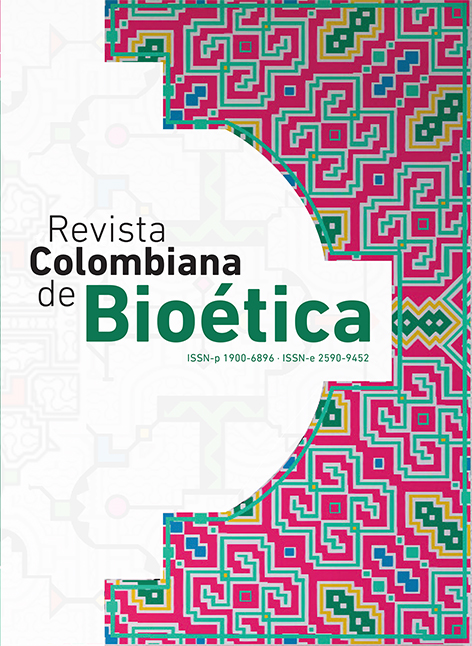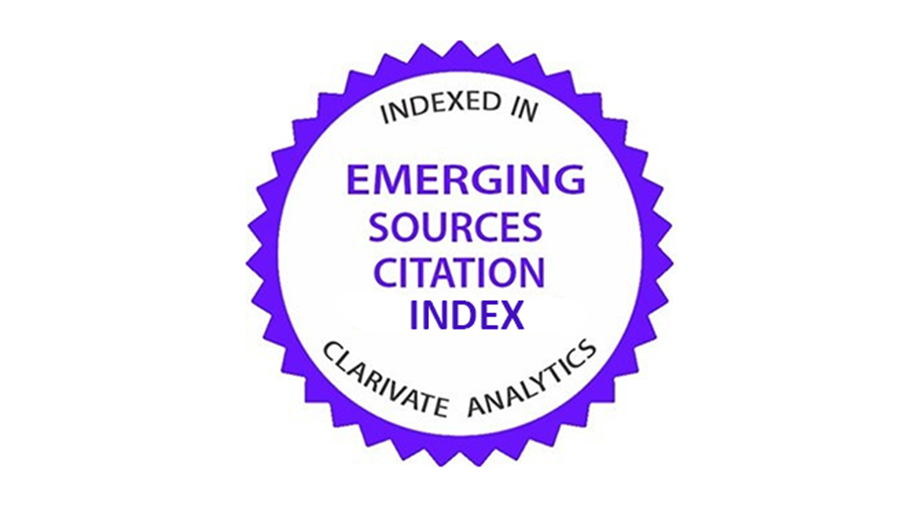Bioethics in the zombie post-apocalypse in the movie World War Z
DOI:
https://doi.org/10.18270/rcb.v16i1.3296Keywords:
moral dilemmas, life, bioethics, zombie, human rights, disease, dehumanization, motion picturesAbstract
Purpose/Context: This article aims to discuss two ethical debates, the first on the relativization of the notions of life, disease, and treatment and the second on guaranteeing the rights of individuals in a context of global uncertainty in the film World War Z.
Methodology/Approach: To analyze this film, the methodological strategy of multimodal discourse analysis proposed by Xu Bo raises the analysis from three levels: the level of the cultural context where ideology and gender are located; the plane of the situational context where the construction of meaning is located through discourse and the plane of the meaning of the image.
Results / Findings: In this research, it was found that the ethical debate on the notion of life, disease, and treatment faces an update of the concept of “life” and of the survival strategies based on the dehumanization of the infected person.
Discussion / Conclusions / Contributions: World War Z exposes the survival actions of humanity in a new reality of global uncertainty that leads to the dehumanization of the infected to justify the actions against them and the exercise of instrumental reason to guarantee individual protection.
Downloads
References
Bishop, Kyle. 2009. "Dean Man Still Walking: Explaining the Zombie Renaissance." Journal of Popular Film & Television 37 (1): 16-25.
https://doi.org/10.3200/JPFT.37.1.16-25
Bo, Xu. 2018. "Multimodal Discourse Analysis of the Movie Argo." English Language Teaching 11 (4): 132-37. https://doi.org/10.5539/elt.v11n4p132
Brooks, Max. 2003. The Zombie Survival Guide. Complete Protection from the Living Dead. Nueva York: Three Rivers Press.
Brooks, Max. 2006. World War Z. An Oral History of the Zombie War. Nueva York: Crown Publishers.
Brooks, Max. 2009. The Zombie Survival Guide. Recorded Attacks. Nueva York: Three Rivers Press.
Forster, Marc. 2013. Guerra Mundial Z. Estados Unidos: Paramount Pictures.
Foucault, Michel. 2010. "La Ética Del Cuidado de Sí Como Práctica de La Libertad." In Obras Esenciales, 1027-46. Madrid: Paidós.
Foucault, Michel. 2011. Historia de La Sexualidad. Vol. 1. La Voluntad de Saber. México: Siglo XXI.
Giroux, Henry A. 2011. Zombie Politics and Culture in the Age of Casino Capitalism. Estados Unidos: Peter Lang.
https://doi.org/10.3726/978-1-4539-1371-0
Harari, Yuval Noah. 2018. Homo Deus. Breve Historia Del Mañana. Coloombia: Debate.
Jacobsen, Michael Hviid, and Keith Tester. 2014. "Introducción." In ¿Para Qué Sirve Realmente Un Sociólogo?, 13-19. Bogotá, D.C.: Paidós.
Khan, Ali S. 2011. "Preparedness 101: Zombie Apocalypse." Centers for Disease Control and Prevention, May 16, 2011. https://blogs.cdc.gov/publichealthmatters/2011/05/preparedness-101-zombie-apocalypse/
Liénard-Yeterian, Marie, and Agnieszka Soltysik Monnet. 2015. "The Gothic in an Age of Terror(Ism)." Gothic Studies 17 (2): 1-11.
https://doi.org/10.7227/GS.17.2.1
McIntyre, Douglas A. 2011. "Zombis Worth 5 Billion to Economy." 24/7 Wall Street, October 25, 2011. https://247wallst.com/investing/2011/10/25/zombies-worth-over-5-billion-to-economy/.
Morrissette, Jason J. 2014. "Zombies, International Relations, and the Production of Danger: Critical Security Studies versus the Living Dead." Studies in Popular Culture 36 (2): 1-27.
Nicotero, Greg, Michael E. Satrazemis, Ernest R. Dickerson, and David Boyd. 2010. "The Walking Dead." Estados Unidos: American Movie Classics (AMC).
Romero, George A. 1968. Night of the Living Dead. Estados Unidos: Walter Reade.
Satrazemis, Michael E., Stefan Schwartz, Andrew Bernstein, and Adam Davidson. 2015. "Fear the Walking Dead." Estados Unidos: American Movie Classics (AMC).
Savini, Tom. 1990. Night of the Living Dead. Estados Unidos: InterCom.
Skult, Petter. 2015. "The Role of Place in the Post-Apocalypse: Contrasting The Road and World War Z." Studia Neophilologica 87 (1): 104-15. https://doi.org/10.1080/00393274.2014.981963
UNESCO. 2006. "Declaración Universal Sobre Bioética y Derechos Humanos." https://www.unisabana.edu.co/fileadmin/Archivos_de_usuario/Documentos/Documentos_Investigacion/Docs_Comite_Etica/UNESCO__Bioetica_y_Derechos_Humanos_2005_unisabana.pdf.
Weiser, L. 2015. "The Zombie Archetype: Living in a Viral Culture." Psychological Perspectives 58 (4): 442-54. https://doi.org/10.1080/00332925.2015.1092807
Downloads
Published
How to Cite
Issue
Section
License
Copyright (c) 2021 Revista Colombiana de Bioética

This work is licensed under a Creative Commons Attribution-NonCommercial-NoDerivatives 4.0 International License.

Esta obra está bajo licencia internacional Creative Commons Reconocimiento-NoComercial-SinObrasDerivadas 4.0.















